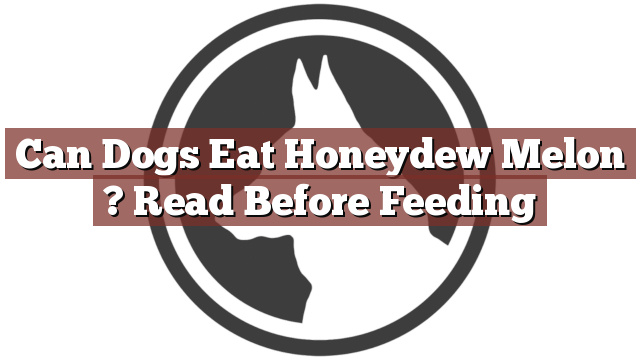Understanding Your Dog’s Dietary Needs
As a responsible dog owner, it’s crucial to understand your pet’s dietary needs. While dogs are primarily carnivores, they can also benefit from certain fruits and vegetables in moderation. However, it’s essential to be aware of which fruits and vegetables are safe for dogs to consume. One such fruit that often raises questions is honeydew melon. Before you decide to share this refreshing fruit with your furry friend, it’s vital to consider whether it is safe for dogs to eat.
Can Dogs Eat Honeydew Melon? Read Before Feeding
Can dogs eat honeydew melon? The short answer is yes, dogs can eat honeydew melon, but in moderation. Honeydew melon is safe for dogs to consume as long as it is served in small amounts and without any seeds or rind. The fruit is known for its high water content, which can help keep your dog hydrated, especially during the hot summer months. Additionally, honeydew melon contains essential vitamins such as vitamin C and vitamin K, which can contribute to your dog’s overall health.
While honeydew melon is generally safe, it’s crucial to introduce it slowly and monitor your dog for any adverse reactions. Some dogs may have sensitive stomachs, and introducing new foods too quickly can lead to digestive issues such as diarrhea or upset stomach. It’s always best to consult with your veterinarian before adding any new food to your dog’s diet, including honeydew melon.
Pros and Cons of Feeding Honeydew Melon to Dogs
Feeding your dog honeydew melon can have several benefits. As mentioned earlier, the high water content in honeydew melon can help keep your dog hydrated. Additionally, the fruit is low in calories and fat, making it a healthy option for dogs on a weight management plan. The vitamins present in honeydew melon can also contribute to your dog’s overall well-being.
However, there are a few considerations to keep in mind when feeding honeydew melon to your dog. The fruit contains natural sugars, so it’s important to serve it in moderation to prevent any potential weight gain or blood sugar spikes. Furthermore, always remove the seeds and rind before serving honeydew melon to your dog, as they can pose a choking hazard or cause digestive issues.
Conclusion: Considerations for Feeding Honeydew Melon to Dogs
In conclusion, dogs can eat honeydew melon, but it should be given in moderation and without seeds or rind. The fruit can provide hydration and essential vitamins to your dog, making it a healthy choice. However, it’s crucial to introduce new foods slowly and monitor your dog for any adverse reactions. If your dog has any pre-existing health conditions or dietary restrictions, it’s best to consult with your veterinarian before adding honeydew melon to their diet. By being mindful of your dog’s dietary needs and making informed decisions, you can ensure their health and well-being.
Thank you for taking the time to read through our exploration of [page_title]. As every dog lover knows, our furry friends have unique dietary needs and responses, often varying from one canine to another. This is why it's paramount to approach any changes in their diet with caution and knowledge.
Before introducing any new treats or making alterations to your dog's diet based on our insights, it's crucial to consult with a veterinarian about [page_title]. Their expertise ensures that the choices you make are well-suited to your particular pet's health and well-being.
Even seemingly harmless foods can sometimes lead to allergic reactions or digestive issues, which is why monitoring your dog after introducing any new food item is essential.
The content provided here on [page_title] is crafted with care, thorough research, and a genuine love for dogs. Nevertheless, it serves as a general guideline and should not be considered a substitute for professional veterinary advice.
Always prioritize the expert insights of your veterinarian, and remember that the health and happiness of your furry companion come first.
May your journey with your pet continue to be filled with joy, love, and safe culinary adventures. Happy reading, and even happier snacking for your canine friend!

